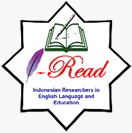Exploring Students’ Perception on Online EFL Learning through WhatsApp Application
DOI:
https://doi.org/10.22219/englie.v4i1.23622Keywords:
Online learning, Students' perception, WhatsAppAbstract
The present study attempted to find out students’ perception in their learning English process through WhatsApp application. The study was conducted based on some facts that there are recently learning delivered by some teaching techniques because of Covid 19 pandemic. Due to the pandemic of Covid 19 has changed the system of education in the world, Indonesia is one of the countries that was influenced and applied distance learning system. The study was conducted in one of the private universities in Tangerang Selatan. There were 20 participants involving in this study who came from the second semester of academic year 2021-2022. To find some accurate data, the researchers collected a data through semi-structure interviews via Google Meet. The students were asked to join some learning activity such as speaking, writing, listening and reading. Then, they were interviewed about what they feel and their experiences during online learning. A qualitative study which focuses on a design narrative was used to get students’ point of view regarding learning English through WhatsApp application. The result showed that the students have a good perception of learning English using WhatsApp. The use of WhatsApp in learning English is very influential on students.
Downloads
References
Ahmadi, A. (2010). Ilmu Pendidikan. Rineka Cipta.
Ajid, L. H., Reni, R., Yunita, D. U., & Dwi, S. (2018). The Use of WhatsApp in Collaborative Learning to Improve English Teaching and Learning Process. International Journal of Research Studies in Educational Technology, 7(1), 29-35
Amanda Bolderston, Cathryne Palmer. (2006). A brief introduction to qualitative research. The Canadian Journal of Medical Radiation Technology, 37 (1), 16-19.
Arumugam, Wan, W. S., Shanthi, A., & Mello, D. (2019). Impact of social media on reading comprehension among undergraduates. International Journal of Advanced Science and Technology, 28(8s), 457–470
Azwar, S. (2013). Sikap manusia : teori dan pengukurannya. Pustaka Pelajar
Barhoumi, C. (2015). The ffectiveness of Whatsaap Mobile Learning Activities Guided by Activity Theory on Student's Knowledge Management. Contemporary educational Technology, 6 (3), 221-238.
Bouhnik, D., Deshen, M., & Gan, R. (2014). WhatsApp Goes to School Mobile Instan Messaging Teachers and Students. Journal of Information Technology.
Creswell, J. W. (2008). Educational Research: Planning, Conducting, and Evaluating Quantitative and Qualitative Research. New Jersey: Pearson Education.
Church, K. & de Oliveira, R. (2013). What’s Up with WhatsApp? Comparing Mobile Instant Messaging Behaviors with Traditional SMS. In Proceedings of the 15th International Conference on Human-Computer Interaction with Mobile Devices and Services (pp. 352-361). New York: ACM. https://doi.org/10.1145/2493190.249322
Harmer, Jeremy. (2007). The Practice of English Language Teaching, Fourth Edition. Pearson Longman: Harlow.
Horton, William & Horton, Katherine. (2003). E-Learning Tools and Technologies: A consumer guide for trainers, teachers, educators, and instructional designers. USA: Wiley Publishing, Inc.
Ifenthaler, D. & Schweinbenz, V. (2016). Students’ Acceptance of Tablet Pcs in the Classroom. Journal of Research on Technology in Education, 48(4), 306-321. https://doi.org/10.1080/15391523.2016.121517
Mistar, I., & Embi, M. A. (2016). Students’ Perception on the Use of WhatsApp as a Learning Tool in ESL Classroom. Journal of education abd Social Sciences, 4, 96-104. http://jesoc.com/wp-content/uploads/2016/08/Edu-76.pdf
Motteram, G. (2013). Introduction: The Benefits of New Technology in Language Learning. In Motteram, G (Ed) Innovations in Learning Technologies for English Language Teaching, British Council, UK
Nguyen, T. (2015). The effectiveness of online learning:Beyond no significant different and future horizons. MERLOT Journal of Online Learning and Teaching, 11 (2), 310-312.
Qiong, O. U. (2017). A brief introduction to perception. Studies in Literature and Language, 15(4), 18–28. https://doi.org/10.3968/10055
Sari, F. M. & Wahyudin, A. Y. (2019). Blended-Learning: The Responses from Non-English Students in the Indonesian Tertiary Context. Teknosastik: Jurnal Bahasa dan Sastra, 17(1), 23-28. 2019.
Sawant, N., & Chari, N.(2021). Whatsapp as an ICT Tool in Higher Education a Survey during Covid Pandemic in the State of Goa. Prepirnts.
Shin, D. (2018). Social Media and English learner’s academic literacy development. Multicultural Education, 25(2)13-16.
Soemanto, W. (2009). Psikologi pendidikan. Rineka Cipta
Walgito, B. (2010). Pengantar psikologi umum. Andi Offset
Yaumi, Muhammad. (2011). Integrasi Teknologi Informasi dan Komunikasi dalam Pembelajaran, Makassar, Lentera Pendidikan 14, no.1 (2011):92.
Yeboah, J. & Ewur, G. (2014). The Impact of WhatsApp Messager Usage on Students Performance in Tertiary Institutions in Ghana. Journal of Education and Practice, 5(6), 157-164.
Downloads
Published
How to Cite
Issue
Section
License
Copyright (c) 2023 Linda Meylinda

This work is licensed under a Creative Commons Attribution-ShareAlike 4.0 International License.
Authors who publish with English Learning Innovation (englie) agree to the following terms:
- For all articles published in English Learning Innovation (englie), copyright is retained by the authors. Authors give permission to the publisher to announce the work with conditions. When the manuscript is accepted for publication, the authors agree to automatic transfer of the publishing right to the publisher.
- Authors retain copyright and grant the journal right of first publication with the work simultaneously licensed under a Creative Commons Attribution-ShareAlike 4.0 International License that allows others to share the work with an acknowledgement of the work's authorship and initial publication in this journal.
- Authors are able to enter into separate, additional contractual arrangements for the non-exclusive distribution of the journal's published version of the work (e.g., post it to an institutional repository or publish it in a book), with an acknowledgment of its initial publication in this journal.
- Authors are permitted and encouraged to post their work online (e.g., in institutional repositories or on their website) prior to and during the submission process, as it can lead to productive exchanges, as well as earlier and greater citation of published work (See The Effect of Open Access).
This work is licensed under a Creative Commons Attribution-ShareAlike 4.0 International License.
















1.png)












